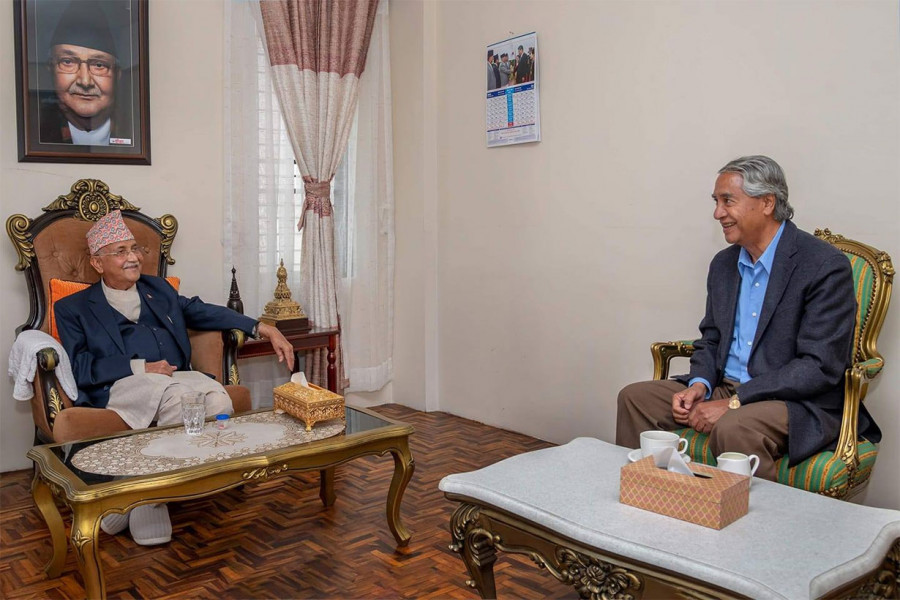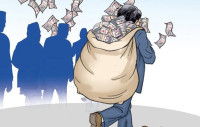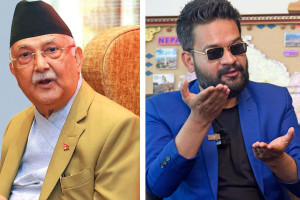Columns
The coalition cannot deliver
Nepal’s biggest parties are losing their core values and aren’t focusing on the actual problems.
Ajaya Bhadra Khanal
Pushpa Kamal Dahal “Prachanda” may not have the moral authority, but the message he delivered in the Parliament as the opposition leader on February 6 reflects the people’s sentiments.
Prime Minister and UML chair KP Sharma Oli and Nepali Congress leader Sher Bahadur Deuba are pretenders. The current coalition will deliver neither economic growth nor democracy. Unless, of course, if you support the NC or the UML and are oblivious to the country’s misfortune.
Nepal’s biggest political parties are losing their core values. They are becoming more corrupt and undemocratic. And any attempt at reform is motivated more by the need to deflect public ire and service the crony capitalists than by a desire to serve the ordinary people.
It is like Dahal said in the Parliament on Thursday. The NC and the UML have led the government 19 times in the last 35 years. Now, after ruling for 35 years, it dawned on the two largest parties that Nepal needs development, as if waiting for six more days to introduce reform bills in the Parliament would be too late.
There are several reasons why the current coalition, which emerged from the dark chambers of a private power broker, is not on the right track.
One could argue that Nepal’s parties were never democratic, including the democratic ones, and that many of them used “democracy” as a rationale to get to power. But at least they tried to look democratic; even the pretence has now gone.
Dahal elaborated some of these points. He questioned the intention behind the amendments in the laws and said it eases the sale of public owned land leased to the private sector and facilitates the wishes of the “land mafia.” He indicated most of the big cases of corruption are carried out in collusion with the private sector and that the next “big” cases of corruption will be linked to land and the capital markets.
The conflict is between the consumers and the big businesses, between the citizens and crony capitalists. Who is going to benefit from the government’s services? The clear answer is that the government is working to serve the interests of the crony capitalists.
Misuse of power is rampant, and collusion between the executive, Parliament and the judiciary is visible. For example, during recent political negotiations, political leaders assured favourable decisions through the judiciary, as if the judiciary is in their control. In the past year, there have been several cases of selective use of power and unequal treatment under the law. Shareholders of the NC and the UML have received a reprieve, others have been arrested for wearing t-shirts.
The reform agenda introduced by the coalition government will not deliver democracy to the people, or foster broad-based economic growth.
First, their reform efforts aim to meet the needs of crony capitalists. Second, they do not seek to address the problem of institutional decay. And third, they do not seek to alter the kleptocratic practices.
Nepal’s top political leaders sit over a huge economy generated by extraction, corruption and impunity.
Nepal’s revised capital expenditure for the current fiscal year is about Rs300 billion. Experts within the government estimate that a huge chunk of the capital expenditure, around 40 percent, is siphoned off for kickbacks and commissions. It means that even if the government manages to spend Rs200 billion in capital expenditure this year, the money that enters the grey economy in the form of kickbacks and cuts would be huge.
Add to that the money earned by selling public offices, kickbacks from licenses and permits, and money extorted from the private sector by regulatory bodies like the Civil Aviation Authority of Nepal (CAAN) and the Department of Revenue Investigation (DRI), the size of the grey economy controlled by the kleptocracy is huge.
If we were to make a rough estimate, Nepal’s top political leaders have full control over a corruption economy that exceeds Rs200 billion a year. While this figure could be incorrect, it indicates an important feature of our political economy and governance practice.
The top leaders and their parties survive because they allow their shareholders, i.e., party workers and supporters, to have a finger on this pie.
Kleptocracy has hollowed out and distorted Nepal’s democratic institutions. Current “reform” efforts are centralised–in fact, they emerge from the private chambers of a handful of power brokers. And they ignore that strong autonomous institutions will be required to deliver good governance, including economic growth and democracy.
The coalition government is more and more fearful and reactionary. Public discontent against the government and big parties has intensified in social media, and this seems to be the primary motivator for the ruling coalition to try to control and criminalise freedom of expression.
Given the lack of political alternatives, Nepal’s economic growth and transition to democracy still depend on the two largest parties.
As the NC transitions to a new leadership structure, it offers a window of opportunity for party reforms. However, it will be futile to place hopes on the party.
Given the financial stakes, intense political competition and the need to accumulate power, any successor to Deuba will succumb to the pressures of kleptocracy and the existing mechanisms of power.
The best hope of democratic reforms in the NC and, as a result, in Nepali politics, was the rise of young Turks like Gagan Thapa. However, their need to seek favour from entrenched power holders in the party suggests that any new force will find it hard to democratise the party and represent the interests of the larger public.
KP Sharma Oli was sworn in as the Prime Minister for the fourth time in July 2024. As per an accord between the two ruling partners, the NC and the UML, he will step down in July 2026. NC leader Deuba will then lead the government until the next round of elections in November 2027.
According to party insiders, Deuba strongly desires to be the prime minister one last time before handing over the party’s reins to a new leader. However, the party needs to have a general convention by December 2025. Under exceptional circumstances, the party can postpone its general convention by a year, which has now become the rule rather than an exception.




 10.12°C Kathmandu
10.12°C Kathmandu.jpg)















